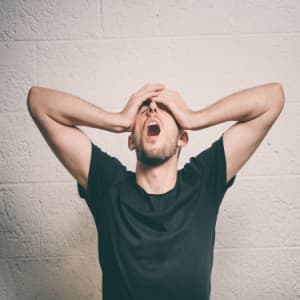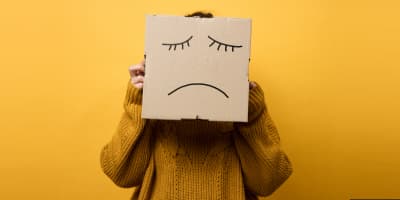


Depression is different to feeling sad or blue for a few days. Everyone will experience that at some point in their lives.
Clinical depression is more intense and lasts longer than two weeks. It interferes with your ability to do the things you are normally able to do.
Even though you might feel alone depression is actually very common.
One in four people will experience depression at some point in their life.
Often people feel embarrassed about sharing this but you should note that it can happen to anyone.
Symptoms of Depression
The symptoms of depression can be divided into three categories.
It is important to be aware which symptoms you experience as these will act as early warning signs that you are starting to feel low.
The earlier you can recognise the signs the earlier you will be able to act before your mood become really low.
Physical symptoms

How your body experiences depression may include
- Tiredness
- Heaviness and fatigue
- Increased or decreased appetite
- Sleep disturbances, such as early waking, trouble getting to sleep, sleeping too much
- Changes in the way you move, either becoming restless or slowing down
Cognitive Symptoms

Your thoughts and thinking patterns may include
- Being negative about yourself such as "I’m a burden and people would be better off without me"
- Being negative about the future such as "This will never change and I’ll never get better"
- Being negative about the world and thinking the world is a bad place
- Only noticing the negatives while overlooking the positives
- Difficulty concentrating and making decisions
- Repeated thoughts of death, self-harm or suicide
- Feeling depressed or down nearly every day
Your emotions may include

- Loss of interest or pleasure in activities
- Feelings of worthlessness, failure or excessive guilt
- Feeling irritated, angry or resentful
Behavioural Symptoms

- Withdrawing from other people
- Difficulty keeping up with usual household tasks or work
- Neglecting your appearance or self-care
- Using alcohol or other substances
- Over or under eating
Depression and Anxiety
Many people with depression also experience anxiety. Negative beliefs about yourself, the world and the future can fuel anxious thoughts and worry that something untoward could happen.
How can I help?
I provide a warm trusting environment where you can explore any difficult experiences and feelings. We will work together to make sense of these problems and what is getting in the way of you living the life you want.
When we have a better understanding of these problems we can start considering meaningful, lasting changes that you can try that will help you enjoy your life more fully.

Leaving you free to enjoy life more fully.
